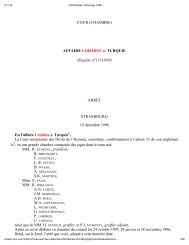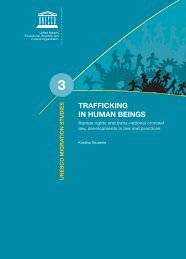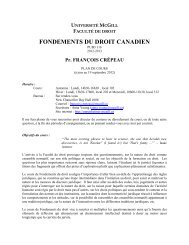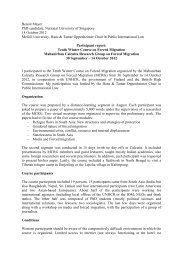Preventive Detention, Suspected Terrorists, and War
Preventive Detention, Suspected Terrorists, and War
Preventive Detention, Suspected Terrorists, and War
You also want an ePaper? Increase the reach of your titles
YUMPU automatically turns print PDFs into web optimized ePapers that Google loves.
COLE FINAL<br />
7/1/2009 12:43 AM<br />
696 CALIFORNIA LAW REVIEW [Vol. 97:693<br />
combatants in an armed conflict with foes such as al Qaeda or the Taliban, their<br />
arguments may have the perverse effect of encouraging states to use lethal<br />
force, or to seek to act outside the law without even the safeguards that<br />
accompany wartime detention.<br />
At the same time, there are three important reasons to be deeply skeptical<br />
of preventive-detention regimes. First, preventive detention rests on a<br />
prediction about future behavior, <strong>and</strong> no one can predict the future. Decision<br />
makers all too often fall back on stereotypes <strong>and</strong> prejudices as proxies for<br />
dangerousness. Humility about our predictive abilities should counsel against<br />
preventive detention. Preventing terrorist attacks is a legitimate social goal, of<br />
course, but there are many ways to do so short of detention, such as securing<br />
borders, enhancing intelligence gathering, safeguarding nuclear stockpiles, <strong>and</strong><br />
developing smarter foreign policy. Locking up human beings is one of the most<br />
extreme preventive measures a state can undertake; it should be reserved for<br />
situations where it is truly necessary.<br />
Second, the risk of unnecessarily detaining innocent people is high,<br />
because decision makers are likely to err on the side of detention. When a judge<br />
releases an individual who in fact poses a real danger of future harm, <strong>and</strong> the<br />
individual goes on to inflict that harm, the error will be emblazoned across the<br />
front pages. When, by contrast, a judge detains an individual who would not<br />
have committed any wrong had he been released, that error is invisible—<strong>and</strong>,<br />
indeed, unknowable. How can one prove what someone would or would not<br />
have done had he been free Thus, the visibility of release errors <strong>and</strong> the<br />
invisibility of erroneous detentions will lead judges to err on the side of custody<br />
over liberty.<br />
Third, preventive detention is inconsistent with basic notions of human<br />
autonomy <strong>and</strong> free will. We generally presume that individuals have a choice to<br />
conform their conduct to the law. Thus, we do not criminalize thought or<br />
intentions, but only actions. Respect for autonomy requires us to presume,<br />
absent a very strong showing, that individuals will conform their behavior to<br />
the law. To lock up a human being on the prediction that he will undertake<br />
dangerous <strong>and</strong> illegal action if left free is, in an important sense, to deny his<br />
autonomy. 10<br />
Thus, any consideration of preventive detention should begin with a<br />
strong presumption that society should deal with dangerous people through<br />
criminal prosecution <strong>and</strong> punishment, not preventive detention. We prohibit<br />
harmful conduct (including conspiracy to engage in such conduct), give notice<br />
that those who violate the prohibitions will be punished, <strong>and</strong> then hold<br />
responsible those who can be shown, in a fair trial, to have engaged in such<br />
10. I am indebted to Alec Walen for this insight. See Alec D. Walen, Crossing a Moral<br />
Line: Long-Term <strong>Preventive</strong> <strong>Detention</strong> in the <strong>War</strong> on Terror, 28 Phil. & Pub. Pol’y Q. 15<br />
(2008).

















